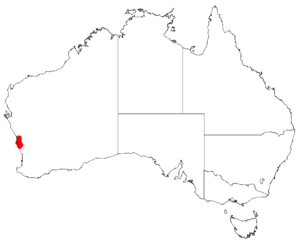Persoonia filiformis facts for kids
Quick facts for kids Persoonia filiformis |
|
|---|---|
| Conservation status | |
| Scientific classification | |
| Genus: |
Persoonia
|
| Species: |
filiformis
|
 |
|
| Occurrence data from Australasian Virtual Herbarium | |
The Persoonia filiformis, also known as the thread-leaf geebung, is a special kind of flowering plant. It belongs to the Proteaceae family, which has many unique plants. This plant only grows in the southwest part of Western Australia. It's a small, upright bush with fuzzy new branches. Its leaves are long and thin, and it has greenish-yellow flowers. These flowers can grow alone or in groups of up to twenty on a stem called a rachis, which can be up to 30 millimeters long.
Contents
What the Thread-Leaf Geebung Looks Like
The thread-leaf geebung is an upright bush. It usually grows to be about 7 to 40 centimeters tall. It has thin bark and its young branches are covered in fine hairs.
Its leaves are arranged one after another along the stem. They are long and narrow, like a line, measuring 10 to 20 millimeters long and about 1 millimeter wide. Each leaf has six clear, straight veins and a sharp point at its tip.
The flowers are greenish-yellow. They can grow by themselves, in pairs, or in groups of up to twenty. These flowers grow along a special stem called a rachis, which can be up to 30 millimeters long. After the plant flowers, this rachis often grows into a leafy shoot. Each flower sits on a smooth stalk, called a pedicel, which is 1 to 2 millimeters long. The flower parts, called tepals, are 11 to 16 millimeters long and smooth on the outside. The greenish-yellow anthers, which hold pollen, are attached to the tepals. This plant usually flowers from November to December.
How We Name and Classify Plants
Persoonia filiformis was first officially described in 1994. A scientist named Peter Henry Weston wrote about it in a science journal called Telopea. He had collected samples of this plant near Jurien Bay in 1980.
Where the Thread-Leaf Geebung Lives
This special geebung plant grows in low, open areas called heathlands. You can find it between the Arrowsmith River and Badgingarra. Both of these places are in the southwest part of Western Australia.
Protecting This Special Plant
The Government of Western Australia's Department of Parks and Wildlife has given Persoonia filiformis a "Priority Three" status. This means that we don't know a lot about this plant, and it's only found in a few places. However, it's not currently in immediate danger of disappearing. Scientists keep an eye on these plants to make sure they stay safe.


